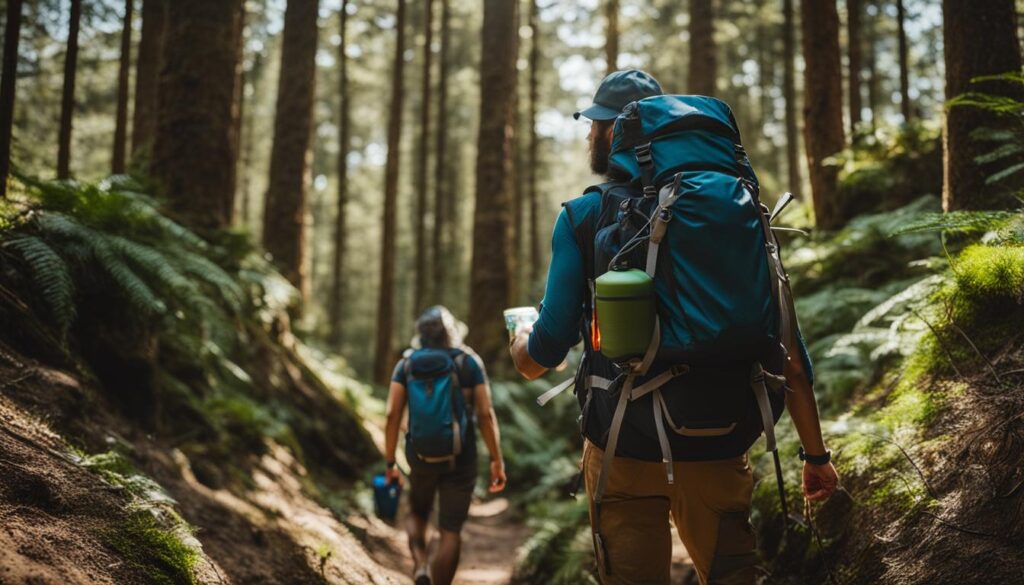When it comes to backpacking, one of the most important things to consider is sustainability. As outdoor enthusiasts, it is our responsibility to minimize our impact on the environment while enjoying the beauty of nature. Sustainable backpacking practices not only help preserve the natural world for future generations but also allow us to make the most of our outdoor adventures. In this article, I will introduce you to the principles of sustainable backpacking and provide you with some eco-friendly tips to follow on your next trip.
Key Takeaways:
- Understanding and implementing the principles of sustainable backpacking is essential for minimizing our environmental footprint.
- The 7 Principles of Leave No Trace provide guidelines for ethical and eco-friendly behavior in natural spaces.
- Picking up trash, reducing single-use plastics, securing food properly, and respecting wildlife are all important eco-friendly backpacking tips.
- Supporting local businesses in trail towns can contribute to the local economy and reduce environmental impacts.
- By practicing sustainable backpacking, we can enjoy outdoor recreation in a way that is conscious of the environment.
Eco-Friendly Backpacking Tips

When it comes to sustainable travel and outdoor recreation, there are several eco-friendly backpacking tips that can help minimize our impact on the environment. By following these tips, we can engage in low impact backpacking and conscious outdoor activities that prioritize the preservation of nature.
One of the most important eco-friendly tips is to pick up trash along the trail. This simple act not only keeps the environment clean but also prevents pollution and protects wildlife. Another great tip is to reduce the use of single-use plastics. By opting for reusable alternatives like water bottles and food containers, we can significantly reduce plastic waste and its negative impact on the environment.
Another crucial aspect of eco-friendly backpacking is properly securing food. Animals that become reliant on human food can disrupt the natural ecosystem, so it’s important to store food in bear-resistant containers and hang them away from campsites. Additionally, following the 7 Leave No Trace principles is fundamental for responsible backpacking. These principles include planning ahead, camping on durable surfaces, and respecting wildlife, among others.
Thinking locally is also a key component of sustainable backpacking. By supporting small businesses in trail towns, we can contribute to the local economy and minimize our environmental impact. This can be as simple as purchasing supplies from local stores or staying at locally-owned accommodations. By choosing green backpacking practices, we can enjoy outdoor activities while being mindful of the environment and leave a positive impact on the places we explore.
| Sustainable Travel Tips | Benefits |
|---|---|
| Pick up trash along the trail | Minimizes pollution and protects wildlife |
| Reduce single-use plastics | Decreases plastic waste and environmental impact |
| Properly secure food | Prevents disruption of natural ecosystems |
| Follow the 7 Leave No Trace principles | Ensures responsible and low impact backpacking |
| Think locally and support small businesses | Contributes to the local economy and reduces environmental impact |
Can Minimizing Environmental Impact also Lead to Sustainable Backpacking Practices?
When it comes to sustainable backpacking practices, the key is to minimize environmental impact backpacking. This can be achieved by choosing eco-friendly gear, minimizing waste, and practicing Leave No Trace principles. By reducing our impact on the environment, we can help ensure that future generations can continue to enjoy the great outdoors.
Conclusion
In conclusion, sustainable backpacking practices and eco-friendly tips are crucial for those of us who want to enjoy outdoor adventures while being environmentally conscious. By following these principles, we can minimize our impact on the natural world and contribute to its preservation for future generations.
Implementing eco-friendly backpacking tips, such as picking up trash along the trail, using reusable alternatives to single-use plastics, and properly securing food, are simple yet effective ways to reduce our environmental footprint. These small actions can make a big difference in maintaining the cleanliness and purity of our natural spaces.
Additionally, adhering to the 7 Leave No Trace principles, including planning ahead, camping on durable surfaces, and showing respect for wildlife, further ensures responsible and sustainable outdoor recreation. By taking ownership of our actions and making mindful choices, we can fully enjoy the beauty of nature while protecting it.
Let’s remember that sustainable backpacking is not just about the experience, but also about our responsibility as stewards of the environment. By being mindful of our choices and embracing environmentally conscious backpacking practices, we can enjoy the great outdoors while leaving it undisturbed for generations to come.

